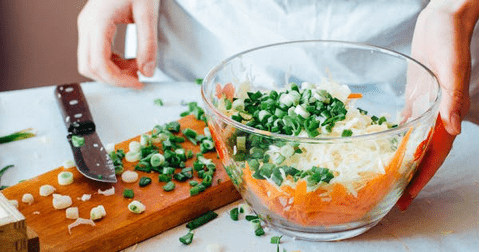

Cooking doesn't come naturally to most people, but it's super simple to learn. It's an impressive skill that takes time to perfect, but anyone can access the tools to learn. The more you practice, the better you'll become and you will soon be on your way to becoming a better cook.
If you're a culinary novice who just never got around to learning the basics of cooking and wants to start preparing fancy meals, it's never too late to tie on that apron and learn to cook.
While ordering takeout and tossing premade frozen dinner in the oven is quick and convenient, there's something special about cooking your meal. Plus, dishes you make yourself are almost always healthier and more wholesome than pre-packaged or processed food.
If learning to cook is overwhelming for you, don't worry. You don't need a lot of experience or fancy equipment to become a better cook. With the right information and mastering a few techniques, you'll create all sorts of tasty dishes.
Be Persistent
They say practice makes perfect, and that's certainly true when it comes to improving your cooking skills. The best chefs are so because they spent years of their lives cooking.
Cooking meals at home regularly will help you refine your skills. That repetition reinforces basic techniques—seasoning properly, getting your pans hot, sharpening your knives—that resonate throughout a lifetime of cooking.
So if you consider yourself a bad cook, it's because maybe you don't cook often enough. Start by preparing your meals at home several times a week, and you'll start to see progress in a matter of months.
Even if you make mistakes or cook something you're not happy with, you can always consider it as a lesson to learn from, so that you know what not to do the next time. Once you get confident with your basic cooking skills and become familiar with a range of ingredients, start experimenting.
Learn the Best Way for You
Learning the basic techniques of cooking is vital to success in the kitchen. Lack of necessary knowledge will jeopardize your chances of producing a culinary masterpiece.
Some of the easy ways to learn these necessary skills are reading cookbooks, blogs, and cooking magazines. Cooking shows and online tutorials are also great resources and are readily available on the Internet. You can also use any of the best cooking apps as an excellent alternative to traditional recipe books. Most of these apps provide thousands of recipes from all over the globe, which you can try.
So, if you want to become a better cook, surround yourself with only high-quality resources and learn from them. Take notes—write down ingredients and techniques you want to try out and learn.
Shop Smart
The easiest way to get good food on the table fast is to ensure you have good ingredients. Make sure you stock your kitchen cabinets and fridge with plenty of fresh and frozen fruits, vegetables, and meats. Don't forget the essentials, such as cooking oils, spices, flour, and rice. Doing so allows you to whip up different dishes without having to rush to the store. It'll also allow you to practice more, perfecting your cooking skills.
Additionally, great cooks know to keep certain ingredients stocked at all times. For instance, you always want to have the following items in your fridge, pantry, or spice rack:
- Commonly-used spices and seasonings (sea salt, black pepper, garlic powder, onion powder, paprika, ginger, turmeric, cinnamon, cloves, cayenne, chili powder, etc.)
- Butter
- Fresh herbs (basil, parsley, cilantro, chives, sage, rosemary, dill, oregano, thyme, mint, etc.)
- Garlic
- Shallots
- Canned chickpeas
- Canned beans
- Canned lentils
One of the effective ways to avoid running out of these ingredients is making a weekly plan of what you're going to cook. Read your recipes and write down a comprehensive shopping list on what you need.
It may sound like a no-brainer, but there's an art of getting through the store with ease. You can organize your shopping list by aisle by breaking it into sections, such as produce, meat, and seafood, dry goods, freezer, dairy, refrigerator, and bakery.
Taste as You Go
Food flavors change and develop as it cooks. For instance, a particular dish may get saltier as moisture evaporates while another could lose acid the longer it cooks.
Therefore, it's important to taste as you go, except raw dough or meat, to know if you need to add more acid, salt, or spice. It also allows you to balance food taste or avoid overcooking. This technique is especially useful when you're trying out a new recipe or ingredient.
Take Your Time
Anyone can cook, but not anyone can make a culinary masterpiece. You need skills, the right knowledge, and resources to become a great cook. But with practice, persistence, and understanding recipes, you can learn to prepare delicious meals your family will enjoy.
Did you like this post on becoming a better cook? You might also like these posts...





Leave a Reply